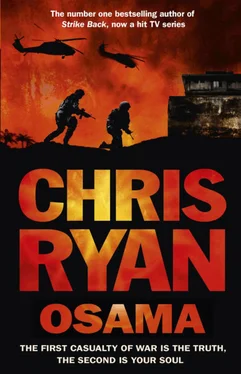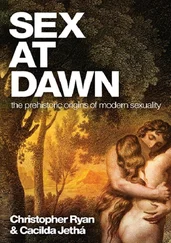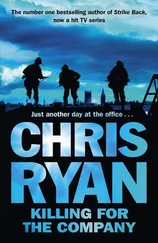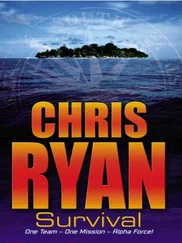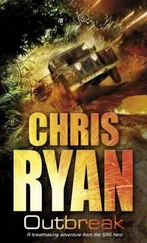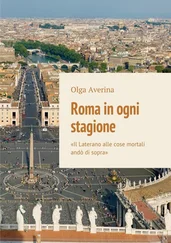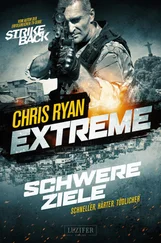A barrier between Joe and his son.
It was just gone 2300 hours when they entered Pembrokeshire. The roads became smaller. The red dot on the satnav approached the blue of the sea.
Joe looked at the time: 2330 hours. Six and a half hours till RV. Thirty metres ahead, the silhouette of an old church emerged from the mist, the clock face on its steeple glowing palely in the night like a second moon. Joe slowed down. The church was on their right. On the other side of the road was a small car park. He saw as he turned in that there were no other vehicles. It looked like the starting location for a country walk, but nobody was venturing out at this time of night and in this weather.
Nobody except Joe.
‘You got the map?’ he asked when he’d pulled over, positioned the car so that it was facing the exit again, and killed the lights.
Eva handed it over. Once he’d opened it out in front of him, it took Joe seconds to locate their position on the map with the interior light. They were two klicks, he estimated, from the house that was his destination. He studied the contour lines carefully. The road on which they were travelling was about to head uphill. Once they reached the brow, there was a direct line of sight from the house towards the road that led to it, in a westerly direction. Even if they travelled without the help of headlights, they would be completely visible to anybody watching them with the right kind of equipment: the warmth of the engine would burn brightly on any thermal-imaging equipment and NV capability would light them up like a fucking Christmas tree.
The bottom line was this: they could go no further in the Range Rover.
He turned to Eva. ‘You’ll be all right here?’ he asked.
She looked around anxiously into the blanket of dark mist. Joe switched off the interior light. ‘Keep it dark,’ he said, ‘otherwise you’ll be blind. Keep the doors locked and the keys in the ignition. If anyone approaches you, head back the way we came. Don’t worry about me.’
‘What if you don’t come back?’
‘I will come back.’
‘But what if you don’t ?’
Joe reached over her, opened up the glove compartment and removed the weapon. ‘I will.’
Frank’s bike was nothing special – a Yamaha TW, its tyres worn almost smooth by constant city driving – and it was certainly not designed to be driven offroad. He’d have to take it carefully to avoid a blowout, but he’d do that anyway: moving slowly, keeping the revs low in order to make as little noise as possible. Not easy, when he wanted to get to the house as fast as possible. To get to Conor. Ashe would definitely try to move him under cover of darkness. The question was, how long before the 0600 RV would he do it? Had Joe arrived in time?
He reversed the bike off its trailer, then examined the OS map again. He’d be heading north across a field for two klicks before coming to a bridleway that would take him through a forested area over the brow of the hill. From there, he hoped, he would be able to see the house – or not, according to the thickness of the fog. But he would need to follow the bridleway down the hill and three miles in a westerly direction, past the house and up to the clifftop by the coast, before heading south for a mile. The bridleway passed approximately half a mile to the west of the house – close enough for the bike’s engine to be heard if the wind was in the wrong direction. He would decide whether to cover that final stretch on the bike or by foot when he was on the ground.
Eva had moved into the driver’s seat. Her hands were resting on the steering wheel as if she was intending to drive away immediately. Joe gave her what he hoped was a reassuring nod. He heard the central locking click shut and started the Yamaha. It coughed unhealthily into life, but then he heard a sound from the Range Rover. He turned to see Eva opening the door again. ‘Joe,’ she said. ‘I hope he’s—’
‘He’s going to be fine,’ Joe replied grimly. He had to believe that, otherwise nothing else mattered. With the bike’s headlight switched off, he increased the throttle and moved away.
The field across which he needed to travel to reach the bridleway was located on the opposite side of the church. It meant manoeuvring the bike across a churchyard crowded with tombstones that seemed to jump out at him from the mist. Joe kept his attention fully fixed on the ground ahead. Within a couple of minutes, he came to the perimeter of the churchyard, where a metal gate, tied shut with a length of frayed rope, marked the edge of the field. Joe untied it, opened the gate and passed through. He left the rope untied: he might need to pass through this way again.
The ground was bumpy. Treacherous. It was beginning to freeze. Joe pushed the bike as hard as he dared, rebalancing himself every time it slipped. His visibility was no more than ten metres – the moon was little help. Beyond that, he was aware of bulky forms moving in the field. Cows, he presumed, or horses. The bike’s low rumble kept them away.
It felt like it took longer than it should to cross the field and reach the bridleway, half his mind on Conor, the other half on the terrain. In reality it was probably no more than the ten minutes he had estimated. There was a second gate on the opposite edge of the field. Joe passed through it and headed up an equally bumpy track at a steep, 25 per cent gradient. Two minutes later he had travelled what he knew from his study of the map to be about a third of a mile – 500 metres or so – and emerged from the mist as he reached the top of the hill.
He dismounted before he reached the brow itself, laying the bike on its side and crawling up to his vantage point. The ground was hard and cold. From this location, looking west towards the shore, Joe could see that the mist, although thick, was patchy and low-lying. It appeared to glow in the yellow light of the hazy full moon, almost like snow. He couldn’t make out where land met sea, but he could discern the lights of a ship out on the water. The rim of the hill on which he was standing ran north to south. He couldn’t see the road he and Eva had been following, but his mental snapshot told him that it forked after about 100 metres. The right fork headed to the top of the cliff, the left fork to a lone house.
And it was this that he could just about make out now.
The house lay, he estimated, about three klicks to the south-west, at approximately ten o’clock from his current position. He used the binoculars to focus in on the house. The magnification was high, the field of view narrow. Normally that wouldn’t be a problem, but tonight his hands were shaking. He had to concentrate hard on making them still before he could get a proper look.
There were no lights on – not, at least, on the northern or eastern sides of the house. But then he remembered that the video he had watched had been shot in a room overlooking the sea. If, as he suspected, it had been taken in this house, that meant it was on the far western side, out of view from this position. He could see the front entrance, and tried to see if there were any vehicles parked outside. But the night was too dark and the binos too weak to make out that kind of detail. After thirty seconds the mist rolled in and obscured the whole of the ground floor from his view, leaving just the steep roof peeping out from above the white blanket.
He cursed under his breath. He’d been hoping for some indication that Conor was definitely there. His boy’s face swam before his eyes, cut, bruised and terrified. With a pang, it hit him that his expression in the video was not so different from the one on his face when Joe stormed into his bedroom and tore his Xbox from the TV. He felt like throwing all this stealth out of the window and storming in a direct line down to the house to rip Conor from this bastard’s clutches as soon as humanly possible. But his military training told him that would be the worst thing to do. He needed to approach unseen.
Читать дальше
